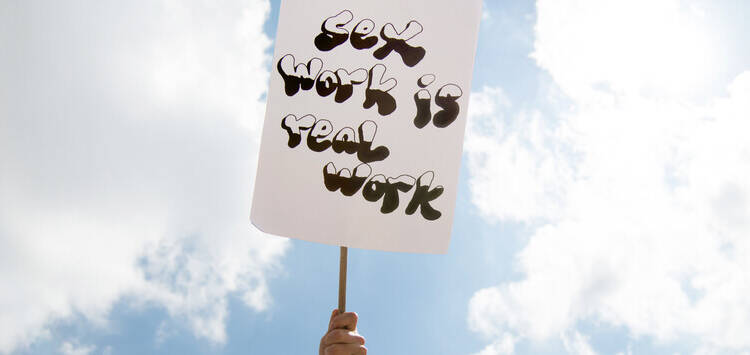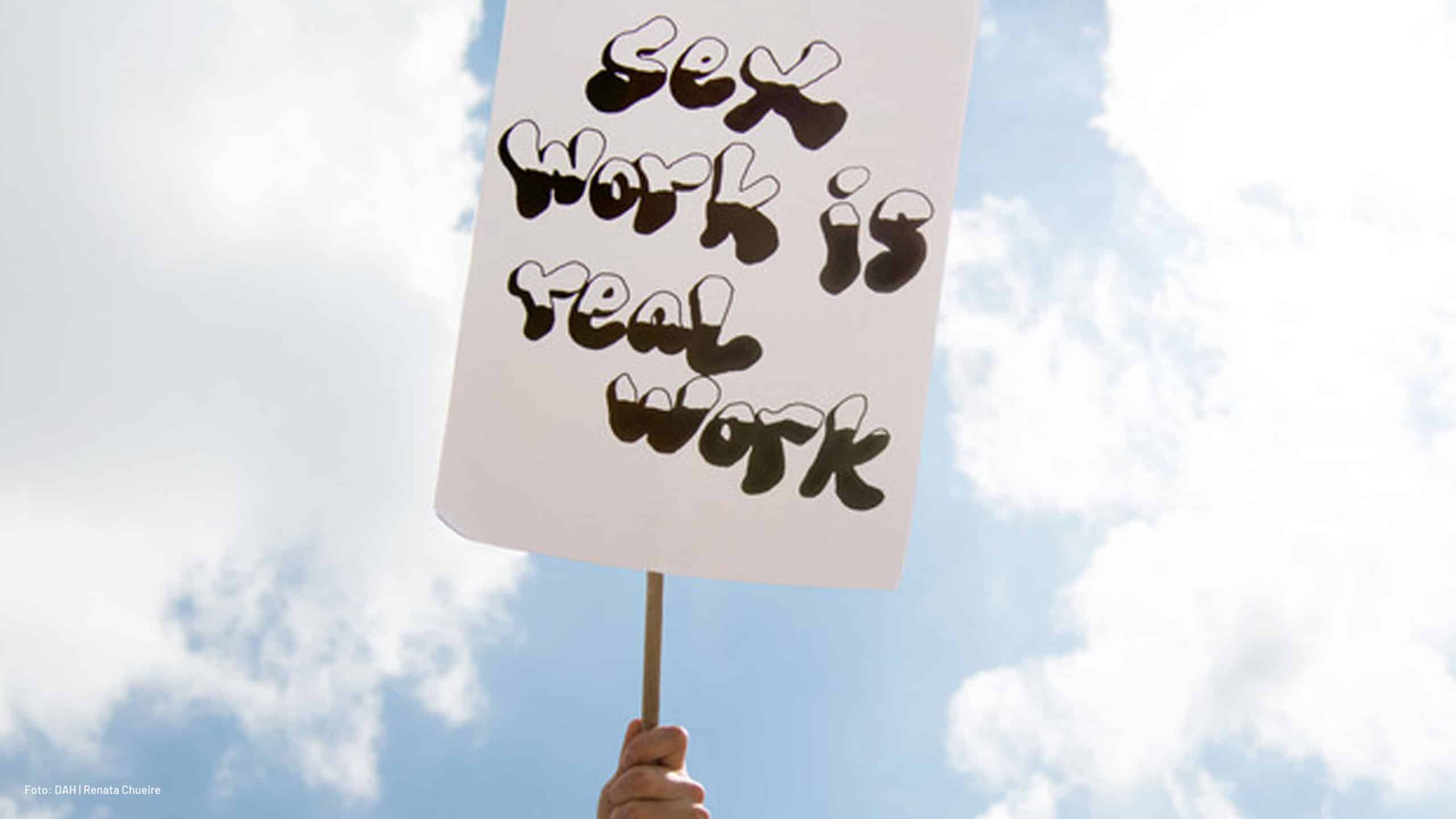Opponents of sex work are instrumentalising the coronavirus crisis and campaigning for a nationwide ban on buying sex. Sex workers are already among those who have been hit particularly hard.
During the coronavirus crisis, those in favour of a ban on buying sex are scenting the morning air. It was therefore no coincidence that over a hundred activists from the "Nordic Model Alliance" met in Bonn at the end of September for a major consultation. Speakers included the most important players in the movement: Alice Schwarzer (publisher and managing director of EMMA), Inge Bell from "Terre des Femmes" and Sabine Constabel from the "Sisters" organisation.
"They all hope to overcome the restrictions imposed by the Corona pandemic to be able to instrumentalise them in order to enforce a ban on buying sex," says Daria, spokesperson for the Professional Association for Erotic and Sexual Services (BesD) in Baden-Württemberg and a member of the board of AIDS-Hilfe Stuttgart since the end of October 2020.
The south-west in particular has become the battleground of the "abolitionists", as the movement's activists like to call themselves in reference to the freeing of slaves in the USA. This is largely due to the Baden-Württemberg SPD member of parliament Leni Breymaier, who acts as their political spearhead. Breymaier has worked long and hard to bring both her SPD state association and the city of Stuttgart behind her.
Stigmatisation of sex workers harms prevention
In terms of content, those in favour of a sex purchase ban are treading on surprisingly thin ice. On the surface, they are concerned with noble goals: Women's rights and combating human trafficking. However, it is unclear whether the ban on buying sex will actually curb sex work and human trafficking. The methodology of many studies is questionable and data can be interpreted in different ways.
However, the proponents leave open the question of how stigmatisation of sex work is supposed to work without simultaneously stigmatising those working in it in a society that still discriminates against and marginalises sex workers today.
On the other hand, a broad alliance is fighting for improvements in the everyday lives of sex workers, or at least to maintain the status quo. It ranges from Professional association for erotic and sexual services (BesD) via the German AIDS Service Organisation, the German Women's Council and the German Association of Women Lawyers up to the Protestant Diaconia. They all fear that a ban on buying sex will above all increase social discrimination against prostitutes and make health prevention more difficult.
Situation with male-male sex work
Cis, trans* and queer sex workers were and are particularly affected by the coronavirus measures. In a joint Position paper were already noted by hustler projects in early summer for the area of "young cis men and queer* sex workers" during the coronavirus restrictions: "In some cases, sex workers have no alternative but to suspend their work. To ensure their survival, they have to accept situational and self-determined exposure to health hazards and risks, as well as fines. This also applies in particular to the sexual work of cis men*, queer* and trans* people in scene contexts. [...] Currently, the threat of homelessness is exacerbated by the loss of income. Since the occupancy of emergency shelters is generally regulated and is severely restricted in times of Covid-19, they often have no choice but to stay on the streets."
Many have been catapulted back into previous situations of violence as a result of the ban on prostitution and the associated loss of their sources of income: "Being forced back into the nuclear family, into violent relationships of dependency, into refugee accommodation and onto the streets is an even greater challenge in the current situation."
The emergency situation leads to greater vulnerability of sex workers
The same applies to cis-female and trans* sex workers. "The clients are becoming more blatant," says Daria Oniér, "because who is hanging around in the dark zone: people who don't want to spend anything, people with high pressure or violent offenders."
BesD press spokesman André Nolte describes the situation as follows: "Agreements are broken. Prices are often being cut, but that's not even the biggest problem of all. Especially as a woman, when you can no longer work in a brothel but have to move into a flat, it can happen that there are suddenly two guys there instead of one."
Many sex workers were catapulted back into previous situations of violence
Human trafficking did not stop under coronavirus conditions, but the fight against it did. The Berlin Senate announced in its Answer from 17 September to a minor question from the FDP in the Berlin House of Representatives admitted that "non-suspicious checks ... were not carried out" because "the approach based on targeted and consensual contact with sex workers was practically unfeasible at a time when prostitution was banned under the SARS-CoV-2 Infection Protection Ordinance". In other words, closing brothels and banning sex work is a major opportunity to effectively combat human trafficking and forced prostitution.
Sex work: short autumn of lifting bans
In Berlin, as in most federal states, sex work was permitted again in autumn after being banned in spring and summer, subject to various conditions. Ralf Rötten from "Help for boys e.V." felt. This is a Berlin-based project for young men who go prostitution. He says: "Many of our clients who were away at the beginning of the coronavirus crisis have returned from their home countries."
Nevertheless, things have not returned to normal. Due to the strict hygiene concepts, fewer visitors came to the association's drop-in centre on the edge of the gay neighbourhood in Berlin. People were no longer allowed to stay overnight and visitor lists had to be kept - which of course contradicts anonymous counselling, but was mandatory because the facility is considered a catering-type establishment.
"Sex workers have not only been confronted with the issue of health since coronavirus"
Rötten has also observed the extent to which the lobby to ban the purchase of sex has gained the upper hand during the crisis and warns: "If there is an illegalisation of clients, then this will affect all clients, which has obviously not yet been understood in the gay scene. We need to actively campaign for the preservation of a diverse but also fair landscape of sexual services."
In most federal states, as in Berlin, a general ban on prostitution remained in place until the beginning of September. This was longer than in comparable sectors of body-related services, despite the fact that the professional association for erotic and sexual services had issued a Detailed hygiene concept had presented. This ranged from talking to customers with mouth and nose protection to coronavirus-compatible positions and airing out afterwards. "Sex workers have not only been confronted with the issue of health since coronavirus," says BesD spokesperson André Nolte. "Why do the courts have to explain this to politicians in many federal states?"
The November lockdown is once again hitting sex workers particularly hard
In mid-October, only Hesse and Mecklenburg-Western Pomerania were still prohibited zones for sex work, but with the second lockdown from 2 November, sex work and most "body-related services" are once again prohibited. The Berlin Infection Protection Ordinance, for example, states that "The provision and utilisation of sexual services with physical contact and erotic massages" are prohibitedin North Rhine-Westphalia is the "Operation of brothels, prostitution centres and similar establishments prohibited".
The situation for sex workers is once again bleak and the future is uncertain. But the last few weeks have shown one thing: Anyone who wants to protect sex workers in Baden-Württemberg and elsewhere in Germany from discrimination and the illegalisation of their working conditions needs more staying power than ever in these times

Editor's note: This article appears in an abridged version. The long version has been published by our colleagues at magazin.hiv.

